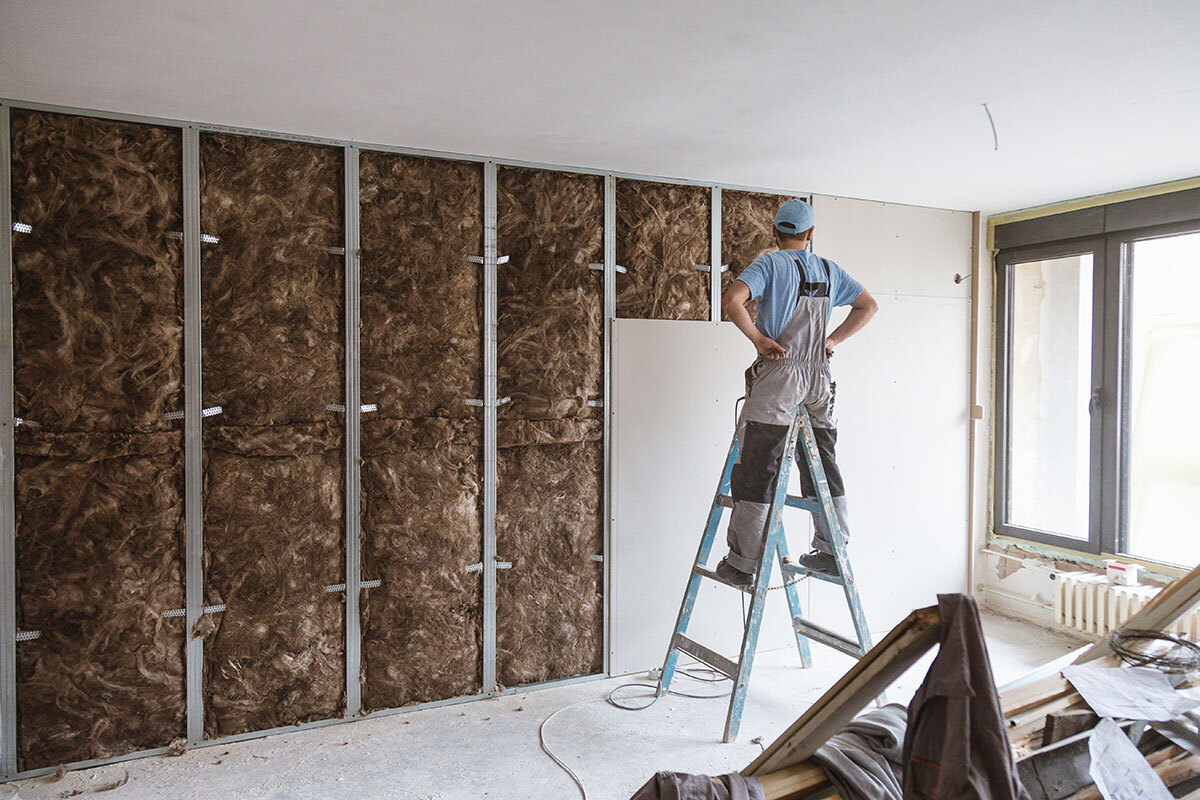It’s vital to take residents with you on the decarbonisation journey. How can landlords do this?
The drive to net zero asks a number of questions about the landlord-tenant relationship. An Inside Housing roundtable, in association with Mears, looks for some answers. Illustration by Neil Webb
In association with:

Decarbonisation is one of the greatest challenges of our time and, when it comes to the price tag, the numbers involved are eye-watering. Inside Housing has estimated that it will cost more than £100bn to decarbonise England’s entire social housing stock.
This shows the level of investment needed if the housing sector is to play its part in meeting the government’s ambitious net zero by 2050 target. But it is not just about the money. Decarbonisation on such an enormous scale simply will not happen if there is not sufficient buy-in and co-operation from all stakeholders – most importantly tenants and residents.
The questions landlords and tenants have to grapple with are legion: do you decant when embarking on retrofit schemes? How do you engage with residents as early as possible? How do you work with tenants so that they make the best use of their homes after energy-efficiency measures are put in place?
To attempt to answer these questions, Inside Housing hosted a roundtable, chaired by editor Martin Hilditch and sponsored by repairs and maintenance provider Mears, drawing on the expertise and experience of landlords, tenants, contractors and other sector experts.
Homes, not assets
One of the key messages that emerges during the discussion is the importance of treating each individual retrofit project as something that is done to people’s homes and communities, rather than a landlord’s asset.
“We’ve approached it from a regeneration point of view,” explains Nicholas Harne, assistant director of neighbourhoods and housing at Hull City Council, when describing the local authority’s methods around resident engagement in its retrofitting projects.
“It’s about investment in homes and in places and communities,” he adds. “What we’ve got funding for is investment in fabric to improve energy efficiency. That’s great, but what we’re interested in is reducing fuel bills to help money circulate around the local economy and in creating jobs and opportunities. What’s great about energy-efficiency works is that it’s ultra-local investment and creates really localised job opportunities.”
In an effort to improve the connection between tenant and landlord on retrofit projects, the Northern Housing Consortium (NHC) launched the Social Housing Tenants’ Climate Jury – a 10-week deliberative process featuring 30 tenants from the consortium’s member landlords. Liam Gregson, member engagement manager at the NHC, says the initiative was “based on the need to make retrofit a collaborative process”.
He adds: “The message was clear on the importance of the customer journey, and a positive tenant experience was central to the long-term success of that.”
The concept of the jury was to initiate and maintain a two-way interaction between the tenant and landlord, with the assumption that both sides of that exchange would be better served as a result. Jury member and Yorkshire Housing resident Terry Tasker agrees that the process of being involved demonstrated how tenants could influence their landlords’ thinking.
“The climate change jury initiative is an important one and should be repeated as it has brought home the fact that many tenants in housing association [homes] could do more to persuade our landlords what works for us in changing our habits,” says Ms Tasker, adding that they would both benefit from a “closer, symbiotic” relationship as the decarbonisation agenda progresses.
Karbon Homes is one of the landlords that took part in NHC’s climate change jury. Anthony Bell, assistant director of assets and regeneration at Karbon, says the findings of the jury show how important it is that landlords “feedback to our tenants and residents” at all stages. In response, Karbon itself has set up climate change working groups, with seven workstreams, led by different parts of the business “to cross-fertilise” what is happening. “It’s important that we’ve got that cross-fertilisation from across the business,” he adds.
Co-production groups
Landlords at the roundtable are looking at different ways of working with their tenants as they navigate their paths to net zero. Thirteen Group, for example, is working with a group of residents in Hartlepool to get their homes as close to net zero as possible “without altering the heating”, as Samantha Granger, head of environmental sustainability at Thirteen, explains it.
At the scheme, residents involved are invited to a working group by the landlord, which Ms Granger says helps foster a sense of involvement. She explains: “One of the key learnings is that customers must feel informed, they must feel involved and they really need to understand what it is we’re doing to their homes.
“That’s one thing we need to think about at all times: it is our asset but it’s also somebody’s home.”
“Most of the solutions lie with the residents,” says Juliana Crowe, chair of the customer experience challenge and assurance panel at Stonewater, outlining why co-production is her organisation’s preferred method for devising its decarbonisation strategy. “We need to accept that we don’t have all the solutions. We need to say what we know but also make it a two-way conversation to hear how [residents] fit into this.”
Brendan Sarsfield, chair of the Sustainability for Housing Board and former boss of Peabody, echoes the sentiment. He says “there are huge opportunities for co-production emerging”, which is particularly useful in the current climate because “things like fire safety have damaged the trust between landlords and tenants”.
Mr Sarsfield says he worries that co-production can at times sound paternalistic. Instead, landlords should be looking at things in a completely different way, he suggests. “Actually we have as much to learn from our residents as we have to share with them.”
He gives as an example the interaction between decarbonisation and saving money on energy bills: “When we retrofit, we think we’re saving on carbon, but actually we are dealing with fuel poverty first. Unless we deal with fuel poverty on this journey, we are not going to reduce the carbon from our homes. So education is important, but it’s a two-way process.”
Tenants are more likely to be immediately concerned by rising energy bills than climate change, says Charley Gibbons, director of customer experience at Orbit. He cites feedback from Orbit residents that showed more were concerned with reducing their bills than climate change when asked to identify the key drivers behind improvements to their homes.
He argues that this insight is important in identifying “where to start the conversation” with customers. “The things they were most interested in finding out about were a lot more immediate to customers: recycling, reducing waste, saving water, choice of household products, car charging points. We are talking to them about those things first and then we can start talking about the more intrusive retrofit work as well.”
Richard Hughes, partnership development director at Mears, suggests there are “degrees of inconsistency” when landlords talk about co-production. He prefers the term “resident first”, which he describes as “putting the consideration of the resident first”. He adds: “People don’t want things done to them, they want to be involved in the decision-making. This is no different and it will be key to success.”
Mr Hughes argues that the point about language is more than just a semantic difference, as simplifying and unifying how retrofit and decarbonisation projects are described will lead to more co-operation between residents and landlords. “There is a need to demystify what this means and [to explain] how it can be seen as just another service to the asset,” he explains. “That is where we’ve got to get to.”
Geoff Tarran, asset surveyor and compliance manager at Crawley Borough Council, which is one of the many local authorities to have declared a climate emergency, agrees that landlords need to have “a resident-centric approach”.
But he says that approach can only go so far when it comes to long-term strategic thinking. “We need to focus on the resident in terms of how we [initially] go in, but the design of the asset needs to be fit for purpose for 10, 20, 30, 40 years into the future,” he points out.
Anne Power, head of housing and communities at the London School of Economics, is another who sees a problem with putting too much responsibility at the feet of residents when it comes to retrofitting.
“Yes, you can’t do it without the residents, but having said that I don’t think it should be ‘residents first’,” she explains. “The landlord owns the property. Residents can support them, but it is the landlord’s responsibility and I don’t want to see landlords let off the hook.”
Ms Power adds that landlords need to ensure they have “really good resident liaison” teams in place, especially when they choose not to decant for a retrofit.
Carbon literacy
Mr Tarran is one of a number of contributors to raise the issue of education as another crucial piece of the jigsaw when it comes to successful retrofitting. “Education is critical,” he says. “We need to make sure that residents understand how to use their homes, and where they have children it’s about making sure they are brought on that journey, too.”
For Helen Ball, sustainability manager at Broadacres, education about the whys and hows of decarbonisation is something that needs to happen for all stakeholders. “In terms of carbon literacy, we are upskilling our colleagues and one thing we’ve talked about is how we can adapt that approach to roll out to customers and equally our suppliers and contractors as well,” she says.
That education process can also help in making the huge changes seem less daunting. She explains: “One of the key things for us is trying to normalise retrofit as much as we can. A lot of change can happen once people get over the fear of it, so the more we can normalise this, the more we can get customers on board.”
Participants
Martin Hilditch (chair)
Editor, Inside Housing
Helen Ball
Sustainability manager, Broadacres
Anthony Bell
Assistant director of assets and regeneration, Karbon Homes
Juliana Crowe
Chair, customer experience challenge and assurance panel, Stonewater
Charley Gibbons
Director of customer experience, Orbit
Samantha Granger
Head of environmental sustainability, Thirteen Group
Liam Gregson
Member engagement manager, Northern Housing Consortium
Nicholas Harne
Assistant director of neighbourhoods and housing, Hull City Council
Richard Hughes
Partnership development director, Mears
Anne Power
Head of housing and communities, London School of Economics
Brendan Sarsfield
Chair, Sustainability for Housing Board
Geoff Tarran
Asset surveyor and compliance manager, Crawley Borough Council
Terry Tasker
Resident, Yorkshire Housing, and member, Social Housing Tenants’ Climate Jury
















